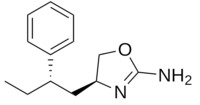RO5256390 or RO-5256390 is a drug developed by Hoffmann-La Roche which acts as an agonist for the trace amine associated receptor 1 (TAAR1), which has been shown to block compulsive and binge-like eating behavior in rats. For this reason, it is being investigated as a potential drug to treat binge eating disorder.[1] The drug shows robust aversive and locomotor-suppressing effects in rodents that are dependent on TAAR1 activation.[2] Similar aversive effects have also been observed with other TAAR1 agonists like RO5263397 and RO5166017.[2][3]
 | |
| Identifiers | |
|---|---|
| |
| CAS Number | |
| PubChem CID | |
| ChemSpider | |
| ChEMBL | |
| Chemical and physical data | |
| Formula | C13H18N2O |
| Molar mass | 218.300 g·mol−1 |
| 3D model (JSmol) | |
| |
| |
Reference section
edit- ^ Ferragud A, Howell AD, Moore CF, Ta TL, Hoener MC, Sabino V, Cottone P (June 2017). "The Trace Amine-Associated Receptor 1 Agonist RO5256390 Blocks Compulsive, Binge-like Eating in Rats". Neuropsychopharmacology. 42 (7): 1458–1470. doi:10.1038/npp.2016.233. PMC 5436108. PMID 27711047.
- ^ a b Shabani S, Houlton S, Ghimire B, Tonello D, Reed C, Baba H, Aldrich S, Phillips TJ (September 2023). "Robust aversive effects of trace amine-associated receptor 1 activation in mice". Neuropsychopharmacology. 48 (10): 1446–1454. doi:10.1038/s41386-023-01578-4. PMC 10425385. PMID 37055488.
- ^ Liu J, Wu R, Johnson B, Zhang Y, Zhu Q, Li JX (October 2022). "Selective TAAR1 agonists induce conditioned taste aversion". Psychopharmacology (Berl). 239 (10): 3345–3353. doi:10.1007/s00213-022-06222-5. PMID 36056214.